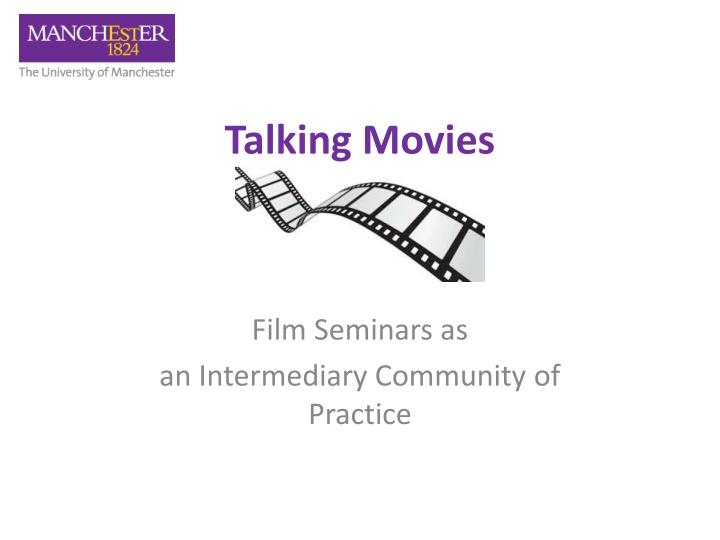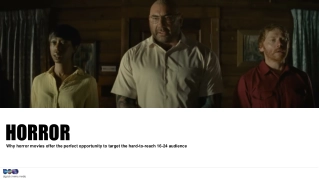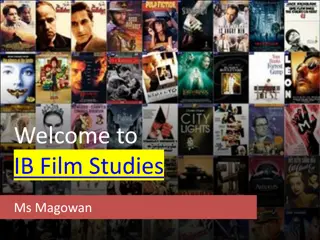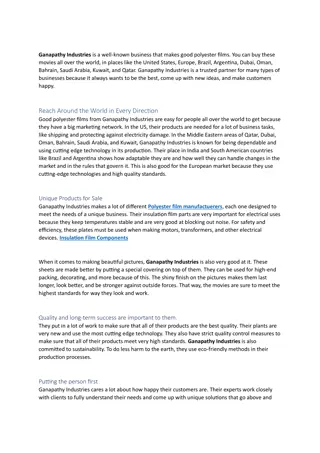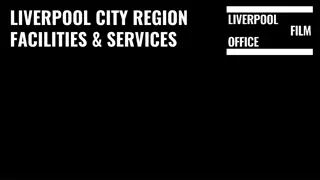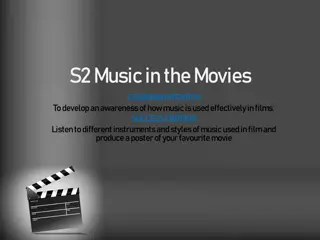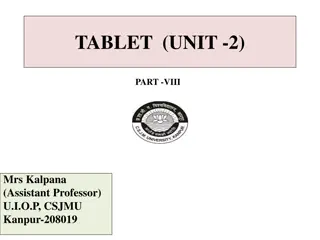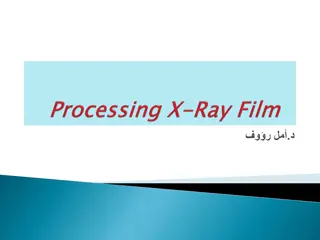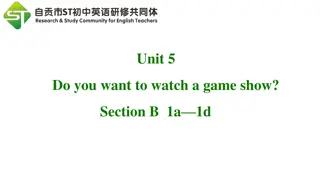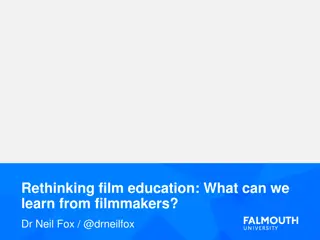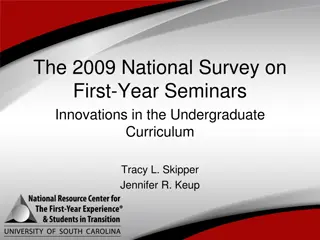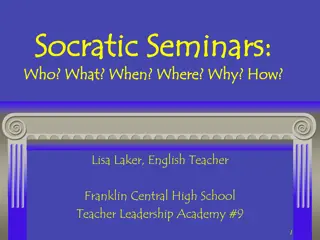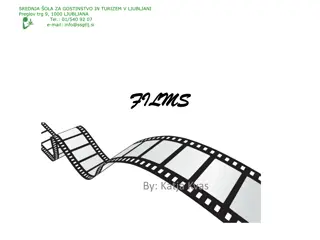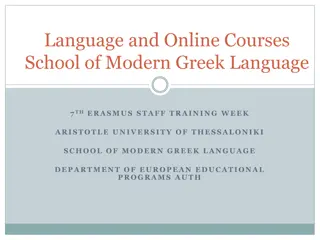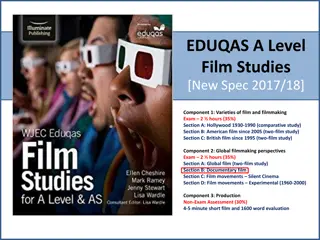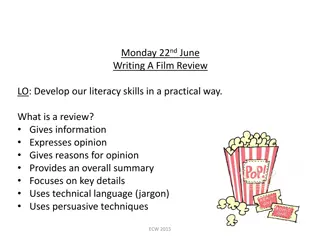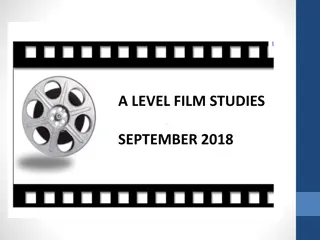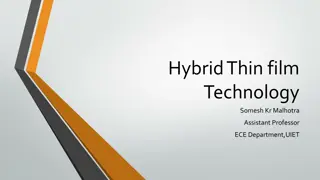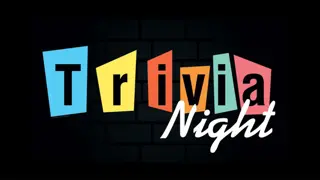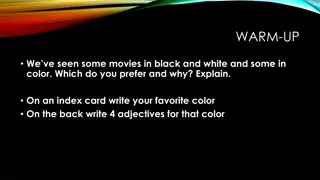Talking Movies Film Seminars as Intermediary Community of Practice
A community of practice focused on film, language, and academic discourse, offering seminars to enhance English studies, intellectual skills, and collaborative learning in higher education.
Download Presentation

Please find below an Image/Link to download the presentation.
The content on the website is provided AS IS for your information and personal use only. It may not be sold, licensed, or shared on other websites without obtaining consent from the author.If you encounter any issues during the download, it is possible that the publisher has removed the file from their server.
You are allowed to download the files provided on this website for personal or commercial use, subject to the condition that they are used lawfully. All files are the property of their respective owners.
The content on the website is provided AS IS for your information and personal use only. It may not be sold, licensed, or shared on other websites without obtaining consent from the author.
E N D
Presentation Transcript
Talking Movies Film Seminars as an Intermediary Community of Practice
Language Experience across Programmes (LEAP)
A community of practice a learning community engaged in a process of collective learning in a shared domain of human endeavor (Wenger-Trayner, 2015) centred on a shared interest in film and a belief in its capacity to enhance English studies by providing a window onto language and culture
Positioned between EAP and disciplinary communities of practice Credit-bearing Not part of degree programme I am not a film academic The workings of academic discourse are exposed
Building a bridge intermediary community of practice (Chivers, 2016) legitimate peripheral participation (Lave and Wenger, 1991) Fosters transition towards full participation in wider academic life and beyond
Course structure Mini lecture + workshop Seminar
Value of seminars on this course? Low stakes, non-threatening Space to develop and test ideas and language for written and oral assignments Chance to learn from others with higher understanding (Tan, 2003) Feedback for me
Value of seminars for general academic development? Initiation into common mode of course delivery in HE, believed to facilitate learning Supports English language students in the move from sociolinguistic groups, where the focus is on communicative needs of the group, such as socialisation or group solidarity to sociorhetorical groups who link up in order to pursue objectives that are prior to those of socialisation and solidarity, even if these latter should consequently occur (Swales, 1990: 24) Develop pragmatic competence (Thomas, 1983) and transferable skills Seminar skills Intellectual skills (criticality, creativity) Communication skills Collaborative skills Language skills Social skills Intercultural skills
Graduate attributes (Barrie, 2004; Hounsell, 2011): research, scholarship and enquiry employability and career development lifelong learning collaboration, teamwork and leadership graduate attributes global citizenship personal and intellectual autonomy communication and information literacy ethical, social and professional understanding
Developing seminar skills: developing awareness of conventions Power distance between teacher and students reduced, reflected in/facilitated by teacher style conversational, encouraging participation Turns quite long and complex Turn-taking managed non-verbally through eye contact, back channels (Hmm, uh, huh) or overlap of utterences Discussion proceeds via moves eliciting information or confirmation Moves supported by justification and evidence Students responsible for preparing and presenting material for discussion All students to contribute silence denotes lack of involvement (Alexander et al., 2011)
Developing seminar skills + intellectual and collaborative skills Negotiation of ideas Co-construction of knowledge, understanding and meaning Ideas are emergent rather than presented already formed for inspection (Alexander et al, 2011:)
Description + analysis (twist on Borton s reflective model, 1970) Description the What? Analysis/Evaluation the So what? This adds to the sense of authenticity in Kes. Loach often uses real people instead of actors. His clothes reflect his evolution through the film as he experiences different groups and attitudes. Clothes are interesting, and that Sean s clothes change throughout the film. This puts a focus on the emotional reactions of the characters. There are a lot of close-ups in this scene. It maybe shows power is shifting. Blair s language seems to become more direct in this phone call.
Criticality, stance, and language Opinion (East is East): George is defeated the half a cup of tea symbolises that George is only half integrated into British society Are there other interpretations? Yes. Better to say: He seems to feel It could symbolise
Developing creativity Where does this music occur in the film? What effect does it have? Put the screen shots of the scenes in order according to which ones disturbed you most (death, sex, drugs, violence, scatological humour). Walk over to the picture of the character you most sympathise with and say why. Stop me writing when you know which quote this is. Where in the film does it occur? Who says it? Why is it important?
Is it working? Do students value seminars? Do they understand the conventions of seminars? Do students feel that seminars are conducive to the development of valuable skills? Why? Do they recognise that these skills are transferable?
Evaluations Word association Closed questions Open questions What skills did you learn/develop? Are these useful in your academic life? Why? What advice would you give to students attending next year re how to take part in seminars?
Word association ? seminars ? ?
Top 4? I---------- I---------- C---------- C-------
Top 4 Interesting (14) Interactive (5) Comfortable (5) Creative (5)
Student experience Interesting (14) fun (5) enjoyable (4) entertaining engaging unforgettable surprising different exciting cool
Student experience An Opportunity Challenging (3) Responsibility Opportunity Ability to speak in public Self-confident about language A Challenge Challenging (3) Responsibility Sometimes shy Nervous A bit stressful Worries Courage
Themes Academic Objective, analysing, perspective, observation Cerebral Stimulating (2), insightful, revealing, thought-provoking, deep, intelligent Formative Formative, developer Collaborative collaborative, exchange, sharing Interactive Interactive (5), dynamic, energetic, activeness, Socio-cultural Enriching, broaden minds, culture, diversity, international
Comfortable (5) Creative (5) Friendly (4) Free Safe No borders Relax Warm Reassuring
Awareness of transferability Academically helpful The skills I have developed in film analysis have been very useful in other classes. This seminar became good practice for other tutorials. It made me think about how to develop certain assessments. Seminars helped me to use more proper language and helped me to develop my writing. [Leading the seminar] required me to make a good structure and organisation which is a skill equally useful for presentations and writings. It made me think about how I can focus my classes on my future career.
Awareness of conventions Table manners in a group seminar It was quite nice seeing a teacher participate in the discussion. I should have a bit more participated in the seminar (my problem!) I ve learned participate in discussion is important since it would motivate not only myself but also the other course mates. Don t prepared something already written.
Sense of progression At first it was very difficult [ ] became much easier At the beginning it was quite complicated but then we got to know each other and it becomes easier. It was quite hard to come up with activities. But I felt positively because everyone was eager to attend the activities.
Increasing confidence Gaining self confidence I am much more confident. I have confidence in speaking up in public. It helps me to be more confident in oral. More confident and less afraid of using English I lose the fraid to speak in loud voice.
Developing communication skills Oratory skills; oral practice; how to debate; speaking in public; I have developed oral [ ] skills. A good way to practice my speaking skills It helps a lot to develop my speech skills. I can reinforce my communicative skills. It can make me speak more and [ ] in front of some people [than if] I haven t attended seminars. I achieved to speak English more fluently as you take active part. The seminars give us the chance to speak more and give our different views or opinions. I have developed my speaking and use of English. It taught me much of how to speak more logically and clearly.
Being aware of audience Expressing yourself in discussion is sometimes difficult because you have to get others to understand your point the seminar was good practice. I needed to use clear and understandable language that others can understand.
Finding a voice It gave me an opportunity to describe my opinion and convey it to other people. It helped me [ ] voice my opinion more than I used to in the past. In the seminars, we had to make our ideas and arguments clear, which is one really important point. With every opinion our perspectives get bigger. We started to look at things in different ways. We were given all the necessary instruments to develop skills and produce successful analysis, without having our own ideas influenced by the tutor to the point of them being not our own anymore. Learning to argue for something and support it with concrete evidence. It helped me realise the importance of supporting arguments with evidence. It forces me to speak and give arguments in English in front of other persons and also to be able to justify all my opinions and choices. Don t be afraid of showing your opinion, because as long as you can explain it, you will always be right.
Developing criticality [I developed] critical thinking. Think about topics from another perspective. It helped me to develop [ ] critical skills and to consider different points of view and different ways of perceiving [ ]. It has allowed me to develop analytical [ ] skills. I learned the method to analyse something. This seminars has helped me to analyze the subject better and developed my ideas. [I developed] logical thinking. Think of films in a diverse way not just [ ] subjective point of view. The seminars taught me [ ] to question myself.
Finding the right words: voice needs language (Argent, 2017) Having to find the right words to express myself. It taught me academic words and expressions and set phrases. Push yourself to try to express the complex concepts. It helped me see how a film comment could be done in an academic way. The skill of expressing opinions using academic language. By being objective while analysing a scene we got use to criticise in an appropriate way. In other words right now we know what kind of language we should use. It helped me to moderate my way of speaking and use expressions expressing my way of thinking without forcing people to think the way I do.
Improving organisation [I learned to] organise an idea. A new way of organising ideas Organise in a better way the ideas I want to develop Structuring my thoughts in a simple, logical and clear way
Learning how to lead a seminar Very useful to develop organisation and leadership skills Leading a seminar [ ] makes you build an outline, manage your time and build a structured analysis. My experience as a seminar leader [ ] pushed me out of my comfort zone. I m not a person who is good at leading something like a discussion [ ] I could manage to do that and I got confidence. I realised I was able to lead a seminar in English. I was really proud of me.
Developing autonomy [Leading the seminar] makes me more autonomous about my academic skills. I [ ] learned to work independently [preparing the seminar].
But Seminars are hard! A bit stressful (cos I know I must say something) Worries (because I am not good at expressing my thoughts in English) Though I have many things that I want to explain, I can t. I still feel like my brain won t work sometimes when using English. Difficult to participate [without knowing the questions beforehand]. Let [us] have preparation time. They don t always work When the students lead the seminar because they re not as experienced so it can be quite chaotic. A guideline of what is important when leading a seminar could be discussed. Don t see them as developing academic skills I couldn t remember we learned academic skills in particular. More like talking to friends than academic discussion. It didn t develop academic skills the essay has. It was difficult to think academic things. I just focus on speaking properly.
References Alexander, O., S. Argent and J. Spencer (2008). EAP Essentials: A Teacher s Guide to Principles and Practice. Reading: Garnet Argent, S. (2017). The language of critical thinking. Available at: https://www.baleap.org/event/eap-northcritical-thinking [last accessed 6th April, 2017]. Barrie, S. (2004). A Research-based approach to generic graduate attributes policy. Higher Education Research & Development, 23, 3. Borton, T. (1970). Reach, Touch and Teach: Student Concerns and Process Education. London: Hutchinson. Chivers, L. (2016). Communities of practice for international students: an exploration of the role of Peer Assisted Study Sessions in supporting transition and learning in higher education. Journal of Learning Development in Higher Education, Special edition: academic peer learning, part two. Available at: http://www.aldinhe.ac.uk/ojs/index.php?journal=jldhe&page=article&op=view&path%5B%5D=366 [last accessed 20th March, 2017]. Hounsell, D. (2011). Graduates for the 21st century: integrating the enhancement themes. The Quality Assurance Agency for Higher Education, 2-3. Lave, J. and Wenger, E. (1991). Situated Learning: Legitimate Peripheral Participation. Cambridge University Press. Jones, J. F. (1999) From silence to talk: cross-cultural ideas on students participation in academic group discussion. English for Specific Purposes, 18/3, 243-259. Kurczek, J. and Johnson, J. (2014). The student as teacher: reflections on collaborative learning in a senior seminar. Journal of Undergraduate Neuroscience Education, 12(2), 93-99. Swales, J. (1990). Genre Analysis. Cambridge: CUP. Tan, B. (2003). Does talking with peers help learning The role of expertise and talk in convergent group discussion tasks. Journal of English for Academic Purposes, 2/1, 53-66 Wenger-Trayner, E. and Wenger-Trayner, B. (2015). Introduction to communities of practice. Available at: http://wenger- trayner.com/introduction-to-communities-of-practice/, [last accessed 2nd September, 2016].
